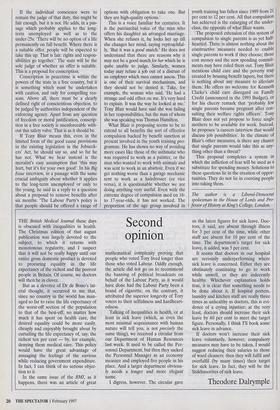Second opinion
THE British Medical Journal these days is obsessed with inequalities in health. The Christmas edition of that august publication was largely devoted to the subject, to which it returns with monotonous regularity, and I suspect that it will not be really happy until our entire gross domestic product is devoted to procuring equality in the life expectancy of the richest and the poorest people in Britain. Of course, we doctors will then be in clover.
But as a devotee of Dr de Bono's lat- eral thought, it occurred to me that, since no country in the world has man- aged so far to raise the life expectancy of the worst-off section of the population to that of the best-off, no matter how much it has spent on health care, the desired equality could be more easily, cheaply and enjoyably brought about by curtailing the life expectancy of, say, the richest ten per cent — by, for example, denying them medical care. This policy would have the great advantage of assuaging the feelings of the envious while reducing government expenditure. In fact, I can think of no serious objec- tion to it.
In the same issue of the BMJ, as it happens, there was an article of great mathematical complexity proving that people who voted Tory lived longer than those who voted Labour. Oddly enough, the article did not go on to recommend the banning of political broadcasts on behalf of the Labour Party, as it would have done had the Labour Party been a brand of cigarette; on the contrary, it attributed the superior longevity of Tory voters to their selfishness and hardheart- edness.
Talking of inequalities in health, or at least in sick leave (which, as even the most minimal acquaintance with human nature will tell you, is not precisely the same thing), we received a circular from our Department of Human Resources last week. It used to be called the Per- sonnel Department, but then they sacked the Personnel Manager as an economy measure and employed five people in his place. And a larger department obvious- ly needs a longer and more elegant name.
I digress, however. The circular gave us the latest figures for sick leave. Doc- tors, it said, are absent through illness for 3 per cent of the time, while other staff are absent for 10 per cent of the time. The department's target for sick leave, it added, was 5 per cent.
It seems that doctors in our hospital are seriously underperforming where sick leave is concerned. Either they are obstinately continuing to go to work while unwell, or they are indecently healthy. Whichever explanation holds true, it is clear that something needs to be done about it. If hospital porters, laundry and kitchen staff are really three times as unhealthy as doctors, this is evi- dence of a crying injustice: at the very least, doctors should increase their sick leave by 60 per cent to meet the target figure. Personally, I think I'll book some sick leave in advance.
If doctors won't increase their sick leave voluntarily, however, compulsory measures may have to be taken. I would suggest reducing their salaries to those of ward cleaners: then they will fulfil and overfulfil (by many times) their target for sick leave. In fact, they will be the Stakhanovites of sick leave.
Theodore Dalrymple


























































 Previous page
Previous page